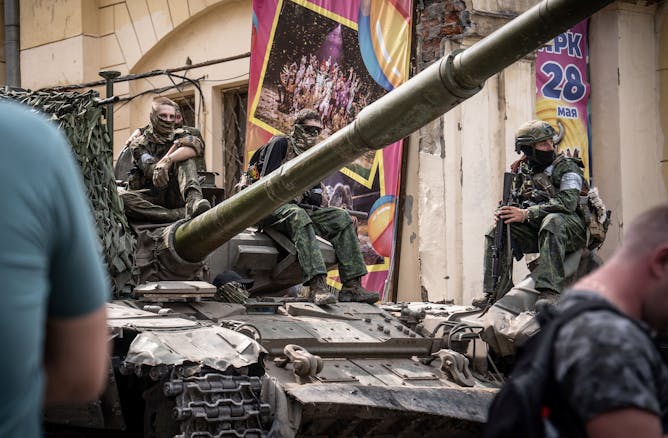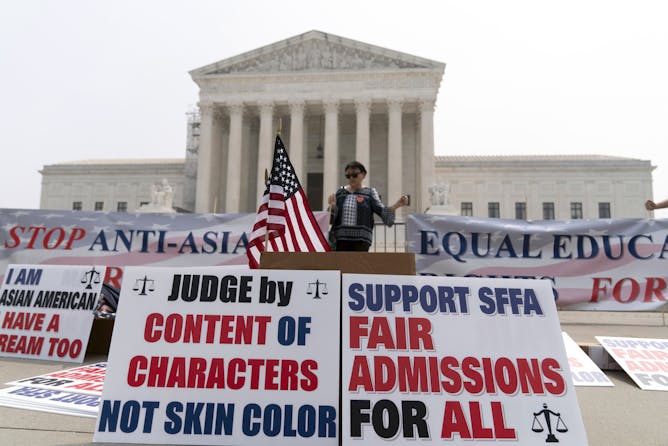|
|
|
|
Happy Sunday – and welcome to the best of The Conversation.
Here are a few of our recently published stories:
This weekend marks 160 years since the bloodiest battle ever fought in the U.S., the Battle of Gettysburg. The three-day fight left more than 50,000 soldiers dead, wounded or missing and is often cited as the turning point in the Civil War.
The battlefield was also the location of Abraham Lincoln’s Gettysburg Address, which begins with the unforgettable words “Four score and seven years ago our fathers brought forth on this continent a new nation, conceived in liberty, and dedicated to the proposition that all men are created equal.” The president went on to thank “those who here gave their lives that that nation might live.”
In one of last week’s reader picks, political scientist Alauna Safarpour describes her investigations into how legacies of the Civil War still affect Americans’ support for political violence today.
“Nowhere close to a majority of Americans are ready to take up arms to overthrow the government,” Safarpour writes. “However, as the Jan. 6 attack on the U.S. Capitol demonstrated, even a small minority of people intent on violence can cause serious harm to the nation.”
Later this week, we’ll bring you stories about the evolving meaning of “We the People,” the fluctuating value of Beanie Babies and why E. coli is not an ideal model organism.
|

|
Emily Costello
Managing Editor
|
|
Readers' picks
|

Members of the Wagner Group sit atop a tank in a street in the city of Rostov-on-Don, on June 24, 2023.
Roman Romokhov/AFP via Getty Images
Ronald Suny, University of Michigan
A historian explains how Russian President Vladimir Putin, weakened by a short-lived mutiny, might find a path to peace with Ukraine.
|
|
|
-
Robert Glennon, University of Arizona
By a narrow margin, the Supreme Court has ruled against the Navajo Nation in a case over water rights in the drought-stricken US Southwest.
-
Alauna Safarpour, Northeastern University
On the 160th anniversary of the Civil War’s Battle of Gettysburg, a political scientist finds that residents of formerly Confederate states express greater support for political violence than others.
-
Nina Mahmoudian, Purdue University
Dramatic improvements in computing, sensors and submersible engineering are making it possible for researchers to ramp up data collection from the oceans while also keeping people out of harm’s way.
-
Peter Rutland, Wesleyan University
Signs of discontent among Russian nationalists and Wagner had been growing before a column of paramilitaries began an aborted march on Moscow.
|
|
Editors' picks
|

A person protests outside of the Supreme Court in Washington, D.C., on June 29, 2023.
AP Photo/Jose Luis Magana
Kristine Bowman, Michigan State University; Kimberly Robinson, University of Virginia; Vinay Harpalani, University of New Mexico
Three legal experts weigh in on what the Supreme Court’s ban on race in college admissions means for students, colleges and universities, and the nation’s future.
|
|
|
-
André O. Hudson, Rochester Institute of Technology
Cell cultures are common tools in biology and drug development. Bringing them up to scale to meet the meat needs of societies will require further development.
-
A. Daniel Jones, Michigan State University; Hui Li, Michigan State University
PFAS can be filtered, but getting rid of the chemicals is a monumental challenge. A biochemist and soil scientist explain.
-
Henry L. Chambers Jr., University of Richmond
It’s official: State courts can review lawmakers’ election-district boundary decisions to ensure they comply with state law.
-
Michael Reid, University of Florida
Imagine an NBA game played outdoors in August, with no substitutions and players wearing snowsuits, gloves and ski masks. Race car drivers routinely compete under similar conditions.
|
|
|
|
|
Like this newsletter? You might be interested in our other weekly emails: About The Conversation: We're a nonprofit news organization dedicated to helping academic experts share ideas with the public. We can give away our articles thanks to the help of foundations, universities and readers like you. Donate now to support research-based journalism
|
| |
| |
| |
| |
|
|
|
|
|
|
|